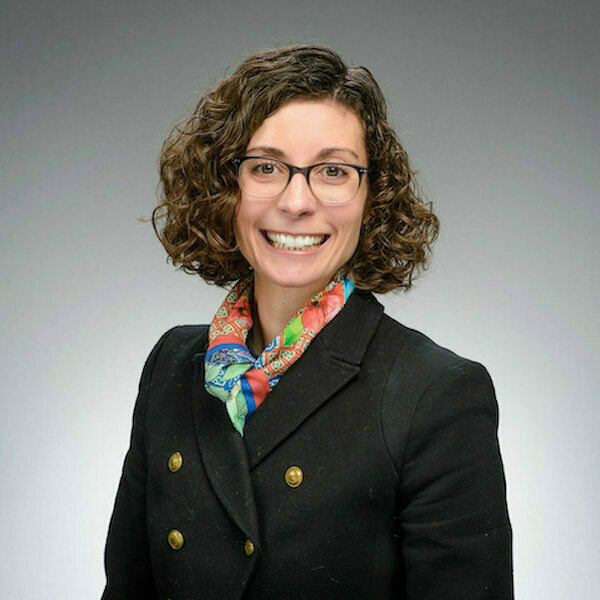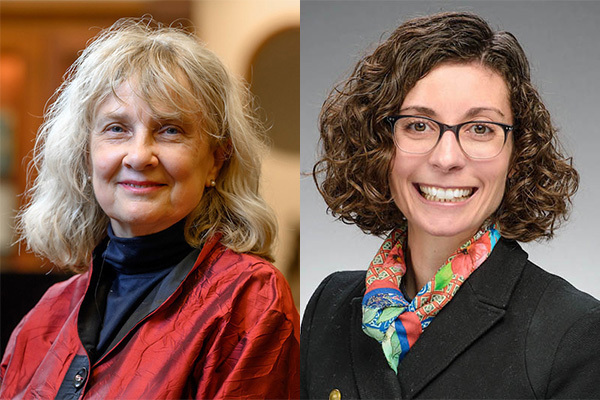
Three faculty members in the College of Arts & Letters have won National Endowment for the Humanities (NEH) fellowships, extending the University of Notre Dame’s record success with the federal agency committed to supporting original research and scholarship.
Shane Duarte, an associate professor of the practice in the Department of Philosophy; Mary Celeste Kearney, an associate professor of film, television, and theatre; and Stephen Ogden, the Tracey Family Associate Professor of Philosophy, are among the 82 scholars to be awarded the competitive fellowships, which were announced Tuesday.
Since 2000, Notre Dame faculty have won more NEH fellowships than any other university in the country.
Additionally, a pair of A&L scholars — Katie Bugyis, the Rev. John A. O'Brien Associate Professor in the Program of Liberal Studies, and Margot Fassler, the Keough-Hesburgh Professor of Music History and Liturgy Emerita — have won a significant, three-year NEH Humanities Initiatives at Colleges and Universities grant to develop a website and to teach medieval liturgy.
“I am delighted and proud that the NEH has again supported our faculty members’ relevant and interesting projects,” said Sarah Mustillo, the I.A. O’Shaughnessy Dean of the College of Arts & Letters. “These four awards highlight the quality of diverse academic research conducted by our experts in multiple fields as well as the excellent support provided by the Institute for Scholarship in the Liberal Arts throughout the application process.”
Reinvigorating an underserved field
With support from their NEH grant, Fassler and Bugyis will develop a website to preserve knowledge about the ritual practices of the medieval Roman Catholic Church and to provide instruction on how to locate, read, and interpret the relevant primary sources.
The pair are liturgical historians who “see our field as underserved,” Fassler said.

“More scholars need to know about the medieval Latin liturgy than ever before,” she said, “and the goal of the website is to offer instruction in a field that has rarely been well-served by the academy.”
Resources and opportunities like digital libraries, catalogs, databases, and thousands of medieval manuscripts have now been made available online. Knowing how to utilize and navigate those resources, though, can be cumbersome and complicated.
“There’s all this material out there, but how do you use it?” Fassler asked. “Our whole enterprise is based on the solving of problems, and on utilizing the skills of our worldwide network of scholars to join in making tutorials.”
Bugyis and Fassler’s plan evolved into an ambitious project — “Medieval Liturgy: Tutorials for Students, Teachers, & Researchers” and was initially supported with a $100,000 seed grant from Notre Dame Research — that is encyclopedic in its scope and pedagogical in its goals.
Their new website, hosted by the Medieval Institute, will feature peer-reviewed teaching videos that will systematically walk people through how to access and work with sought-after information. Fassler and Bugyis are inviting interdisciplinary liturgical scholars from Notre Dame and around the world to share their expertise, which will make their website a dynamic and evolving resource.
Main website sections will include resources on the fundamental components of medieval liturgy — the arrangement of the church year in its annual cycle; the performance of the hours of prayer that constituted the Divine Office in every monastic church and cathedral; and the celebration of Mass. Additional units will feature other liturgical rites, women’s rites, and liturgical music.
Understanding the liturgy is essential to understanding the Middle Ages, Bugyis said, but fewer and fewer graduate programs are training students in the liturgy.
“Notre Dame is one of the last places doing it. There is an abundance of resources here,” she said. “We saw a real opportunity, given the strengths that we have, to draw on the expertise of faculty and graduate students to create something new and important.”